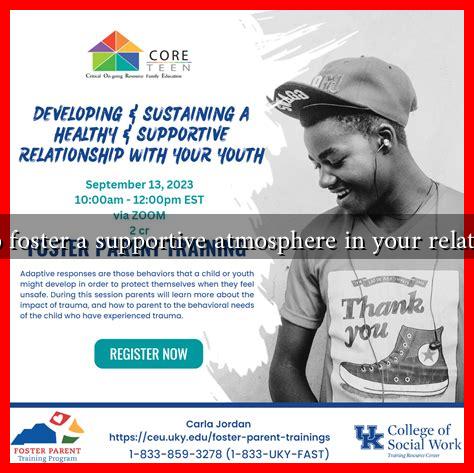-
Table of Contents
How to Foster a Supportive Atmosphere in Your Relationship
Creating a supportive atmosphere in a relationship is essential for its longevity and health. A nurturing environment allows both partners to thrive, communicate openly, and feel valued. This article explores practical strategies to cultivate such an atmosphere, backed by research and real-life examples.
Understanding the Importance of Support
Support in a relationship goes beyond mere emotional backing; it encompasses understanding, encouragement, and validation. According to a study published in the Journal of Personality and Social Psychology, couples who provide emotional support to each other report higher levels of satisfaction and commitment in their relationships. A supportive atmosphere can lead to:
- Improved communication
- Increased trust
- Enhanced emotional intimacy
- Better conflict resolution
Key Strategies to Foster Support
Building a supportive atmosphere requires intentional effort from both partners. Here are some effective strategies:
1. Open Communication
Effective communication is the cornerstone of any supportive relationship. Partners should feel safe expressing their thoughts and feelings without fear of judgment. Here are some tips for fostering open communication:
- Practice active listening: Show genuine interest in what your partner is saying.
- Avoid interrupting: Let your partner finish their thoughts before responding.
- Use “I” statements: Express your feelings without blaming your partner (e.g., “I feel upset when…”).
2. Show Appreciation
Regularly expressing gratitude can significantly enhance the supportive atmosphere in a relationship. A study from the University of California found that couples who express appreciation for each other report higher relationship satisfaction. Consider the following:
- Compliment your partner regularly.
- Thank them for their efforts, big or small.
- Celebrate their achievements, whether personal or professional.
3. Be Present
Being emotionally and physically present for your partner is crucial. This means putting away distractions and focusing on each other during conversations. Here are some ways to be more present:
- Schedule regular date nights to reconnect.
- Engage in activities together that you both enjoy.
- Limit screen time during conversations to foster deeper connections.
4. Encourage Growth
A supportive relationship encourages personal growth. Partners should motivate each other to pursue their goals and dreams. This can be achieved by:
- Discussing individual aspirations and how to achieve them.
- Offering help and resources when needed.
- Being each other’s cheerleader during challenging times.
Case Study: The Power of Support
Consider the case of Sarah and John, a couple who struggled with communication. After attending a relationship workshop, they learned the importance of expressing appreciation and being present. By implementing these strategies, they reported a significant improvement in their relationship dynamics. Sarah noted, “I feel more valued and understood, and it has made a world of difference.” Their story exemplifies how fostering a supportive atmosphere can lead to positive changes.
Statistics on Relationship Support
Research indicates that supportive relationships can lead to better mental health outcomes. According to a report by the American Psychological Association, individuals in supportive relationships are:
- 50% less likely to experience depression.
- 40% more likely to report high levels of life satisfaction.
- 30% more likely to maintain a healthy lifestyle.
Conclusion
Fostering a supportive atmosphere in your relationship is not just beneficial; it is essential for long-term happiness and fulfillment. By prioritizing open communication, showing appreciation, being present, and encouraging growth, couples can create a nurturing environment that allows both partners to thrive. Remember, a supportive relationship is a two-way street; both partners must be committed to cultivating this atmosphere. As you implement these strategies, you will likely notice a profound transformation in your relationship dynamics, leading to a deeper connection and greater satisfaction.
For more insights on building healthy relationships, consider visiting the American Psychological Association.

